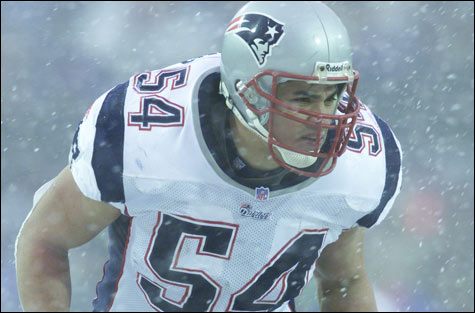
|
The New England Patriots may be the most tight-lipped organization in all of sports. But as the 2007–2008 season neared, Pro Bowl linebacker Tedy Bruschi broke the code of silence with the publication of Never Give Up: My Stroke, My Recovery & My Return to the NFL (Wiley), which he wrote with Patriot Reign author Michael Holley. Although Bruschi doesn’t give up much in the way of Patriot game plans, it’s a candid account, not just of events surrounding the stroke he suffered a week and a half after the Patriots’ 2005 Super Bowl victory but of financial struggles, drinking problems, and the tensions that erupted between Tedy and his wife, Heidi, when he returned to football after undergoing surgery to repair the congenital heart defect that caused the stroke. It’s personal stuff — not the sort of thing we’re used to hearing from a Patriot, much less a player who’s been on the roster for a dozen years. But raising stroke awareness is that important to Bruschi. Indeed, even in the midst of the controversy over videotaping defensive signals, he was focused when he called from his home in North Attleboro.
I’m surprised you reveal so much of yourself — your personal life and even your interactions with Coach Belichick — in the book. That’s not considered a violation of team policy?
[Laughs] We are very close to the vest when it comes to football and the media. But this was me revealing who I am off the field. It would have been easy for me to say, “I just want people to forget about the stroke.” But I’ve made it a passion of mine to educate people not only about what I went through but also about what a stroke is, and what the warning signs are. The biggest thing that bothers me about the whole experience is that when I was having a stroke I didn’t know I was a having a stroke. I’ve slept before and at times I’ve rolled over and cringed because of a pain in my shoulder or something like that. So I thought to myself, “Let’s sleep this thing off.” And that was the absolutely wrong thing to do. If I’d known about the warning signs, I could have gotten myself to the hospital and the symptoms possibly could have been reversed right there on the spot.
But you also talk about things like problems you had with drinking and about how aware you were of your family’s precarious finances growing up . . .
I thought it was important to tell people how I got to be who I am, because then people would understand why I attempted the comeback. When I decided to play again, I couldn’t understand why I received so much criticism — comments about me being egotistical or selfish or that I couldn’t live without the fame of playing professional football — when I just wanted my life back. It irritated me — it upset me and my family. But I also thought, “Okay, I think I’m going to have to educate these people and let them know that there are a lot of people who have strokes — even younger people, even 31-year-old football players — and that you can get your life back and recapture what you were before.”
To play at the professional level, you have to believe you’re invincible . . .
Yes, when you’re out there with the shoulder pads and the helmet on, you’ve got to believe that you can enforce your will and go through another man.
How do you regain that after a stroke?
What I had to do was relive a lot of firsts. Like my very first hit coming back — I took my first hit in practice, and then I said to myself, “Am I still here?” So I had doubts. I didn’t tell this in the book, but when I was coming back, I called my doctor and asked him for the number of a person who had done this before. And he said, “You’d be the first.” Another thing they told me was that I was in a data-free zone. They were getting their data from me.
I think people are going to be surprised by how normal your life is off the field.
If we were the same people off the field as we are on the field, a lot of us would be in jail. You have to know when to say to yourself, “I’m not on the field anymore, there’s no need to be that violent, that physical, that aggressive.” You have to know when to turn it off. That can come from the mandatory meetings we have in training camp, and you can hear it from the head coach and the owner, but you have to have guys in the locker room setting the example that other guys can look to.
And you’re one of those guys.
I try to be.